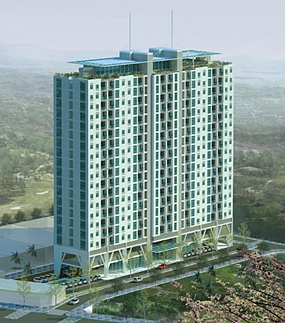High interest rates are slowing down the residential property market in Vietnam as potential buyers find it difficult to get loans, it is claimed. According to Nhaban.com, Vietnam’s biggest real estate website, buyers cannot get bank financing as interest rates have soared to 22.42%, one of the highest in the region.
The central bank has increased its refinancing rate to 15% from 9% while lending costs for some businesses are up to 25%. So the whole market has more or less slowed down despite there being many purchasers who want to buy but cannot borrow the money.
 An artist’s rendering shows the proposed Hoa Sen Apartment building in Ho Chi Min City. Vietnam’s property market has stalled due to rising interest rates. (Photo/Nhaban.com)
An artist’s rendering shows the proposed Hoa Sen Apartment building in Ho Chi Min City. Vietnam’s property market has stalled due to rising interest rates. (Photo/Nhaban.com)
It is estimated that 29.2 million people in urban areas and 62.2 million people in the countryside will need property in the next few years. The real estate market will only recover when loan interest rates decline, a seminar heard in HCM City in February.
Speaking at an event hosted by Vietstock Communications, Dr Le Xuan Nghia, vice chairman of the National Financial Supervision Committee, said though the Government’s efforts to curb inflation have yielded results, banks’ interest rates have not dropped significantly.
Prof Dr Dang Hung Vo, a former deputy minister of natural resources and environment, said the real estate market would continue to face a shortage of capital this year.
The sector should not have high expectations of foreign investment as foreign investors would only enter the market when they see property prices drop sharply, he warned. Both Nghia and Vo agreed however that there was unlikely to be a situation where property developers sold on the cheap.
Vo explained away the steep price cuts made by some developers as being due to the poor location of their projects.
The tight monetary policy and oversupply in some segments have forced property investors to cut prices, but this was not a widespread occurrence, Nghia said.
Many people are still holding out for high prices, so foreign investors consider Vietnamese property prices high, he said.
Speaking about possible development opportunities this year, Vo said the market could improve in the third quarter when banks’ liquidity problems are expected to partially ease and credit would again begin to flow into it.
The Government has given priority to restructuring the monetary and banking sectors, and already approved the national housing development strategy from now through 2020, he said, referring to the need for more housing to be developed under the strategy.
Nghia predicted the low-priced housing segment to recover first, by mid-2012 at the earliest. (PR Log)




